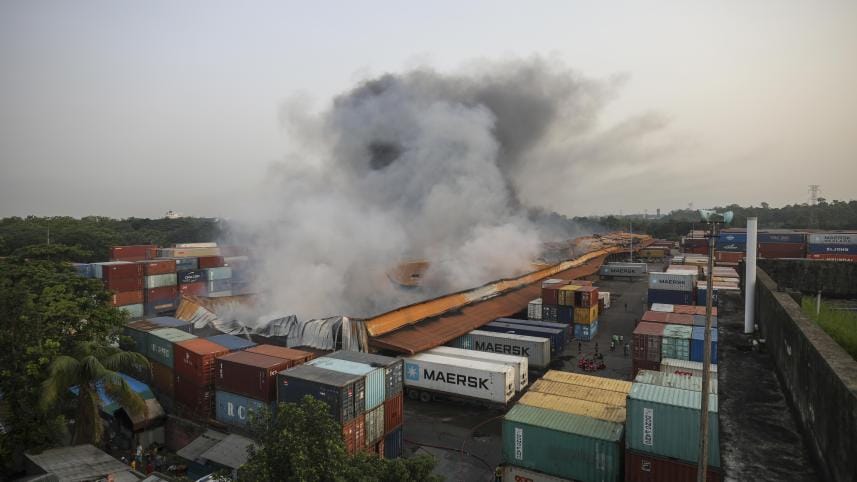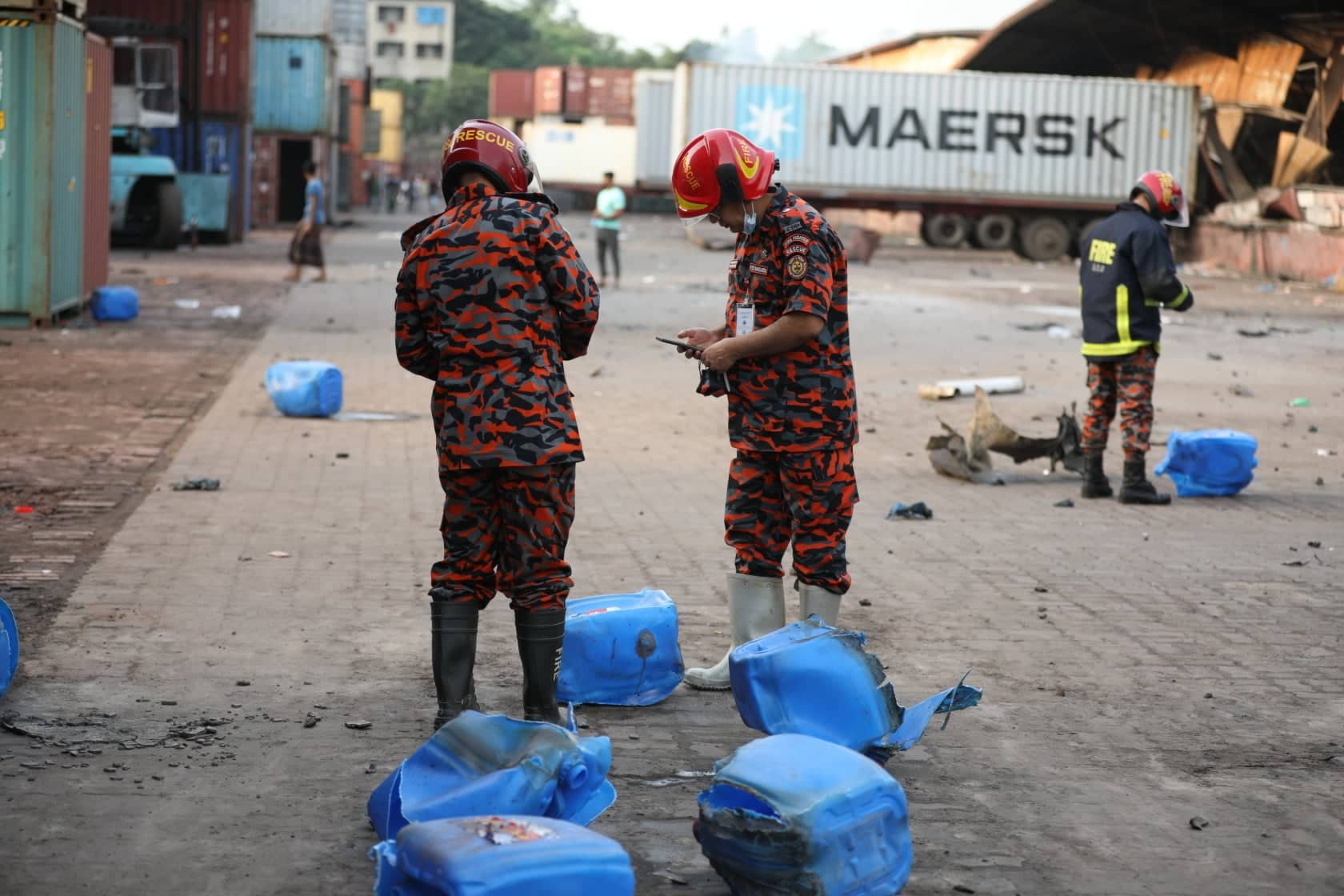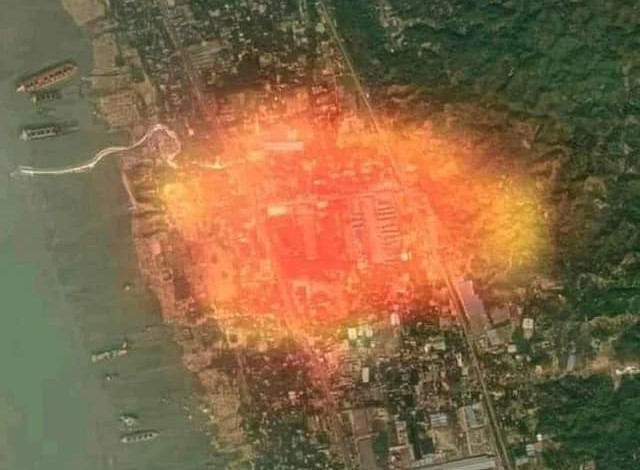Ctg depot fire: Lives engulfed by apathy

As dawn broke on the morning of June 5, 2022, the areas surrounding BM Container Depot Ltd resembled nothing short of a war zone. Charred human bodies strewn randomly, the burned gagging in pain, fire all around, sporadic explosions erupting in multiple places, everything turned into ash.
At least 49 people including nine firefighters (as of 7pm Sunday) have perished, and hundreds injured, in the fire that has been ravaging the container depot in Sitakunda upazila, Chattogram since 10pm on June 4. Reverberations from the explosion shook around four kilometres of the area surrounding the depot. Windows of the nearby houses were shattered by the force of the blast.
It is suspected that the fire originated from one of the containers stored there. According to media reports, the depot houses more than 50,000 containers, many of them containing chemicals.
One of the major blasts took place at a 500-metre corrugated sheet shade, which housed a huge quantity of hydrogen peroxide – an oxidising chemical – which can intensify fire and is a major fire hazard when combined with other chemicals and substances.
According to media reports, the firefighters who died had been working near a container, which exploded, killing them instantly. On Sunday morning, the media cell of the Fire Service and Civil Defence said they had not been informed of chemical storage in the depot containers beforehand. Had they been aware, perhaps they could have taken safety measures to protect the lives of the people and firefighters there.
As of 7pm Sunday, the fire is still burning and explosions are still taking place. Firefighters are not able to go near the fire sites because of the explosions. Army personnel have been sent to the site to help contain the fire. A specialised firefighting unit has also been sent to the spot. According to media reports, since the depot authorities cannot be located, it has become even more difficult to identify which containers contain inflammable materials.
This incident does not fail to remind one of the 2020 Beirut explosion, in which more than 200 people were killed and the port was razed to the ground. That, too, happened due to unsafe storage of a hazardous chemical: ammonium nitrate. While the scale of the Chattogram depot fire is smaller compared to the Beirut blast, the causes seem to be the same: irresponsible storage of hazardous materials and chemicals, which unfortunately seems to have become a norm in Bangladesh.
Why were the firefighters not informed that the containers stored hazardous chemicals and materials? Was BM Container Depot Ltd even cleared to store inflammable chemicals? No. This daily, citing officials from the Department of Explosives, reported that the depot authorities did not even secure any licence to store hydrogen peroxide. Now, the question is: Without such a licence, how can a depot house such a large amount of a hazardous chemical? What is even the point of rules and guidelines if they are not properly enforced?
After every fire incident, politicians and authorities engage in hyperbole – or so it seems – regarding reforms in and reinforcement of relevant laws and guidelines. But the reforms and enforcement never see the light of day.
Handling and storage of hazardous materials and chemicals are some of the least-talked-about issues, despite causing some of the major fire incidents engulfing the image of the country. And these fire incidents not only claim lives; they take a toll on the environment as well. It has been reported that in the aftermath of the fire in Sitakunda, the hazardous chemicals are contaminating the local water sources and spreading in the nearby areas. Locals are saying the contaminated water is trailing to the Bay of Bengal, putting the marine lives there and the entire water body at risk. Such an incident on World Environment Day only exposes our total apathy towards proper handling of materials that puts our environment at risk.
Chattogram Divisional Commissioner Mohammad Ashraf Uddin has said that they are taking measures to stop the water from contaminating the Bay of Bengal, but what those measures are, they are yet to disclose.
In the wake of the Chattogram depot fire, it has been declared that Tk 50,000 will be provided to the families of those who have died, while Tk 20,000 will be provided to the injured. In addition, Tk 1 crore has been allocated to provide food and assistance to the affected people. But is this compensation enough? How is an insignificant sum of Tk 50,000 going to help the family of a breadwinner who perished in the fire? How long would this amount sustain the victims? Are the families even going to get the amount on time – given that we have a history of such compensations not reaching the victims? What about the environment? How are the authorities going to compensate the environment for the damage it is sustaining now, even as we read this column?
It is high time the authorities took the issue of handling and storage of hazardous materials and chemicals seriously. Had inspection teams visited the BM Container Depot as per a routine practice, this fire incident might have not taken place at all. All these lives could have been spared.
The government and the authorities should thoroughly review the existing laws, policies and guidelines related to fire safety and amend them if needed in order to make them watertight. They should also scrutinise the enforcement and application processes and procedures to close any loopholes in the regulations, so that unscrupulous businesses can no longer exploit them to illegally store such chemicals and materials. At the same time, the government should hold accountable the officials responsible for the supervision of the container depots in the Sitakunda area, and investigate why they did not do the due diligence on their part, which resulted in such a huge amount of hydrogen peroxide being illegally stored in a depot. Also the NBR, which is usually responsible for keeping track of import and export declarations, should be asked if they were aware of the chemicals stored in the depot. If yes, why did they not inform the authorities concerned to ensure safe storage through inspection? If not, why were they not doing their job properly?
We need to set a precedent of holding government officials accountable for their actions (or lack thereof) or else their hibernation and gross apathy towards their responsibilities will never end. All the container depots across Bangladesh should be inspected on a regular basis to ensure that they are storing goods and chemicals as per set protocols. If businesses are found guilty of not following the protocols, they should be penalised heavily so others are discouraged from violating them.
The parameters for inspection of such container depots – especially the private ones – should include factors such as fire management systems, if there are sufficient fire extinguishers in place, whether there are enough trained and well-equipped manpower to handle such fire incidents, the safety protocols for such incidents, if containers are labelled properly, if they are kept in the designated and marked spaces, and so on. Without these operational and logistical efficiencies, the risk cannot be minimised.
Fire incidents due to mishandling of hazardous materials is becoming a serious problem for Bangladesh. It cannot be allowed to continue. The authorities must pull up their socks before another fire incident occurs – perhaps bigger, more ferocious – claiming more lives, and razing the economy and the environment to the ground.
Tasneem Tayeb is a columnist for The Daily Star. Her Twitter handle is @tasneem_tayeb




 For all latest news, follow The Daily Star's Google News channel.
For all latest news, follow The Daily Star's Google News channel. 




Comments